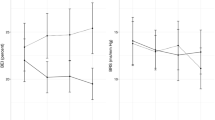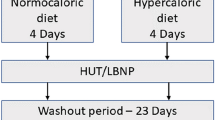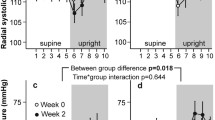Abstract
In chronic autonomic failure, food ingestion causes a profound and rapid fall in supine blood pressure and aggravates postural hypotension. Food volume and caloric load are important determinants of gastric emptying and postprandial splanchnic hyperaemia, which appears to be a major contributor to hypotension. We therefore compared the cardiovascular effects of three large meals with six small meals providing an identical daily caloric intake, in seven subjects with primary autonomic failure. Daytime ambulatory blood pressure (BP) was measured by Spacelabs 90207 every 30 min with additional recordings while lying, sitting and standing, 30 min after each meal. Systolic and diastolic BP were lower in all three positions after large meals; systolic 131 versus 151 mmHg (large versus small), p=0.005, 109 versus 124 mmHg, 89 versus 103 mmHg and diastolic 76 versus 90 mmHg, p=0.02, 66 versus 78 mmHg, p=0.07 and 50 versus 66 mmHg, p=0.06 for lying, sitting and standing, respectively. Between meals, BP fell to lower levels with large meals, 88 (20) mmHg versus 104 (19) mmHg, p=0.002 and 48 (13) mmHg versus 63 (13), p=0.0001 mmHg for systolic and diastolic pressure respectively. Five subjects had more symptoms of postural dizziness after large meals. In primary autonomic failure, smaller and more frequent meals reduce postprandial hypotension and diminish postural symptoms post-meal. This is likely to be a useful non-pharmacological method in the management of postprandial hypotension.
Similar content being viewed by others
References
Mathias CJ, da Costa DF, Fosbraey P, Bannister R, Wood SM, Bloom SR, Christensen NJ. Cardiovascular, biochemical and hormonal changes during food-induced hypotension in chronic autonomic failure.J Neurol Sci 1989;94: 255–269.
Mathias CJ, Holly E, Armstrong E, Shareef M, Bannister R. The influence of food on postural hypotension in three groups with chronic autonomic failure-clinical and therapeutic implications.J Neurol Neurosurg Psychiat 1991;54: 726–730.
Mathias CJ, Bannister R. Investigation of autonomic disorders. In: Bannister R, Mathias CJ, eds.Autonomic Failure: a Textbook of Clinical Disorders of the Autonomic Nervous System. Oxford: Oxford University Press, 1992; 255–291
Fara JW, Rubinstein EH, Sonnenschein RR Intestinal hormones in mesenteric vasodilation after intraduodenal agents.Am J Physiol 1972;233: 1058–1067.
Premen AJ, Kvietys PR, Granger DN. Postprandial regulation of intestinal blood flow: role of gastrointestinal hormones.Am J Physiol 1985;249: G250-G255.
Thulin L, Samnegard H. Circulatory effects of gastrointestinal hormones and related peptides.Acta Chir Scand 1978;144 (suppl. 482): 73–74.
Fahrenkrug J, Haglund U, Jodahl M, Lundgren O, Olbe O, Schaffalitzky de Muckadell O. Nervous release of vasoactive intestinal polypeptide in the gastrointestinal tract of cats:possible physiological implications.J Physiol (Lond.) 1978;284: 291–305.
Hoeldtke RD, d'Orisio TM and Boden G. Treatment of autonomic neuropathy with a somatostatin analogue SMS 201-995.Lancet 1986; ii: 602–605.
Kooner JS, Peart WS, Mathias CJ. The peptide release inhibitor, Octreotide (SMS 201-995) prevents the hemodynamic change following food ingestion in normal human subjects.Q J Exp Physiol 1989;74: 569–572.
Mathias CJ, da Costa DF, Fosbraey P, Christensen NJ, Bannister R. Hypotensive and sedative effects of insulin in autonomic failure.Br Med J (Clin Res) 1987;295: 161–163.
Brown RT, Polinsky RJ, Baucom CE. Euglycemic insulin-induced hypotension in autonomic failure.Clin Neuropharmacol 1989;12: 227–231.
Sidery MB, Macdonald IA, Blackshaw PE. Superior mesenteric artery blood flow and gastric emptying in man and the differential effects of high fat and high carbohydrate meals.Gut 1994;35: 186–190.
McHugh PR, Moran TH. Calories and gastric emptying: A regulatory capacity with implications for feeding.Am J Physiol 1979;236: R254-R260
Hunt JN, Stubbs DF. The volume and energy content of meals as determinants of gastric emptying.J Physiol (Lond.) 1985;245: 209–225.
Mathias CJ, Bannister R. Postcibal hypotension in autonomic disorders. In: Bannister R, Mathias CJ, eds.Autonomic Failure: a Textbook of Clinical Disorders of the Autonomic Nervous System. Oxford: Oxford University Press, 1992; 489–510.
Onrot J, Goldberg MR, Biaggioni I, Hollister AS, Kincaid D, Robertson D. Hemodynamic and humoral effects of caffeine in autonomic failure-therapeutic implications for postprandial hypotension.N. Engl. J. Med. 1985;313: 549–554.
Author information
Authors and Affiliations
Rights and permissions
About this article
Cite this article
Puvi-Rajasingham, S., Mathias, C.J. Effect of meal size on postprandial blood pressure and on postural hypotension in primary autonomic failure. Clinical Autonomic Research 6, 111–114 (1996). https://doi.org/10.1007/BF02291232
Received:
Accepted:
Issue Date:
DOI: https://doi.org/10.1007/BF02291232




